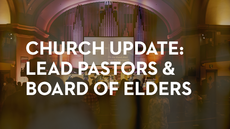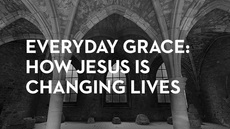That which was from the beginning, which we have heard, which we have seen with our eyes, which we looked upon and have touched with our hands, concerning the word of life—the life was made manifest, and we have seen it, and testify to it and proclaim to you the eternal life, which was with the Father and was made manifest to us—that which we have seen and heard we proclaim also to you, so that you too may have fellowship with us; and indeed our fellowship is with the Father and with his Son Jesus Christ. And we are writing these things so that our joy may be complete.
Interpretation
- Read John 1:1–5. In light of this, what could the author mean by “the word of life” of 1 John 1:1–4? What attributes of Jesus are revealed in 1 John 1:1–4?
- What is the “beginning” to which the author refers? Read John 1:1–2, 8:58; Colossians 1:15–18; 1 John 2:13; and Revelation 17:18. The Greek word for “made manifest” is phanerō, which is defined as “to cause to become visible, to cause to become known . . . [this includes] both sensory and cognitive connotations.” Twice John uses this word. What point is he trying to make? Why is this important? See Philippians 2:5–7; John 17:6–8; 1 Timothy 3:16; and 1 Peter 1:20.
- The apostle proclaims that which was from the beginning has been made manifest. What is “the beginning”? Read Colossians 1:20, 2:9, and Philippians 2:6–7.
- Why does John “proclaim” and “testify” about his experience with Christ? Read 1 John 1:5, 4:14, 5:9–10, and Acts 4:19–20.
- Fellowship is one of the ultimate purposes of John’s letter. How can the church gain fellowship and love one another? Read John 17:20– 21; 1 Corinthians 1:9; Philippians 1:5, 2:1; and 1 John 1:7.
- The apostle also writes “so that our joy may be complete.” What joy is he looking toward? How can “joy” be completed? Read John 15:11, 16:24, 17:13; Philippians 2:2; Cf. Luke 15:10; Philippians 1:25; and Psalm 16:11.
Application
- In her commentary on 1 John, Karen Jobes writes, “John wishes to point to the Word who is eternal life as the grounds for assurance about eternal life.” How does the reassurance of eternal life change your daily life? See Romans 15:13 and Titus 1:2.
- In the Gospel of John, Jesus refers to himself as the life (John 11:25, 14:6). The promise of life in Christ isn’t just a future eternal life, but has implications for right now. How does the Word of life change the nature of your daily life?
- The Incarnation’s awesome power is the God of all glory become flesh. In what ways do you ascribe glory to God? In what ways do you seek to ascribe glory to yourself?
- Martin Luther described his reaction to the incarnation this way: “When I am told that God became man, I can follow the idea, but I just do not understand what it means. For what man, if left to his natural promptings, if he were God, would humble himself to lie in the feedbox of a donkey or to hang upon the cross?” What have you learned about the character of God through the Incarnation? How has Jesus’ earthly life and death changed your position before God? Read 2 Corinthians 8:9, Ephesians 2:1–10, and Jude 24.
- The Apostle John cannot but proclaim and testify about his experience with the living God in the flesh, even decades later as an old man. How do you proclaim the work of Jesus in your life?
- In John 17:21, Jesus prayed that those who believe in him would have the same unity of fellowship that he has with the Father. What does fellowship with God look like? What about fellow believers?
- Robert Candlish describes earthly joy as being “dependent upon outward circumstances and has no deep root in the soul itself.” Where do you seek joy? When have you experienced joy through fellowship with God?
This devotion is adapted from the 1 John Study Guide. Pick up a copy today for only $9.99. The study guide includes 13-week curriculum with small group studies and group inductive studies.















